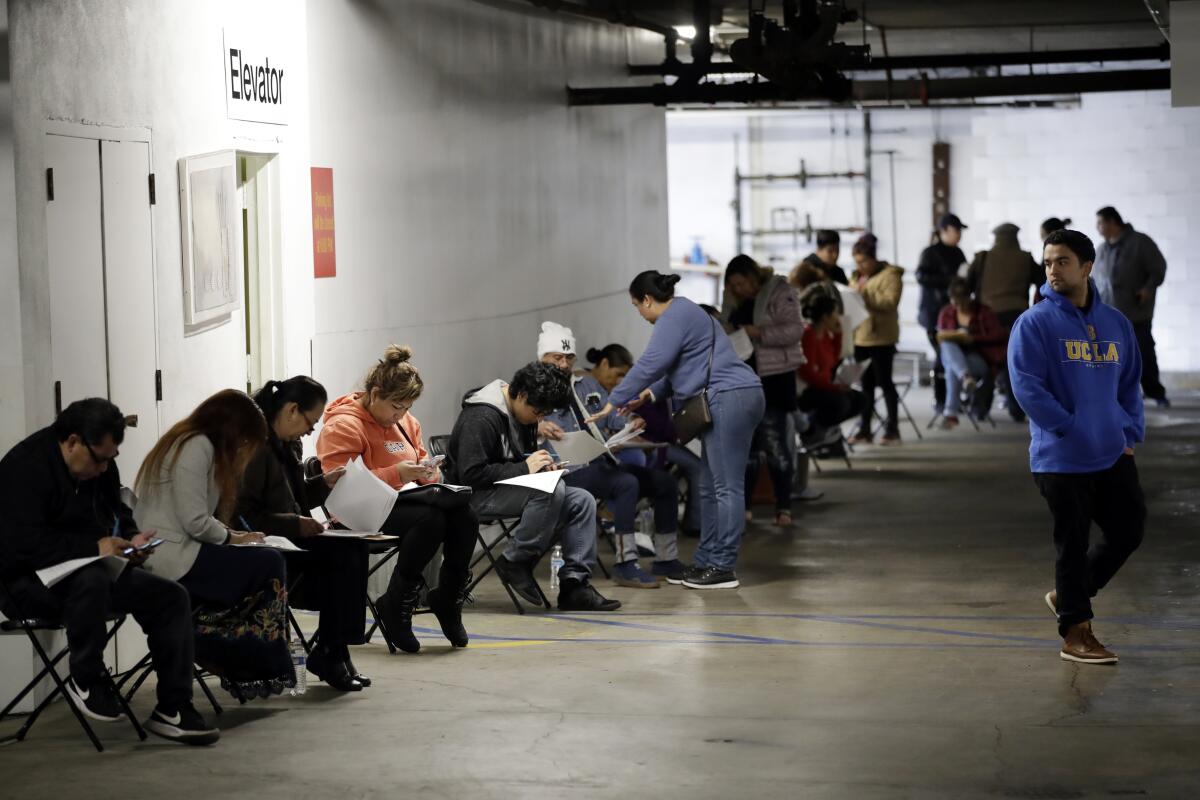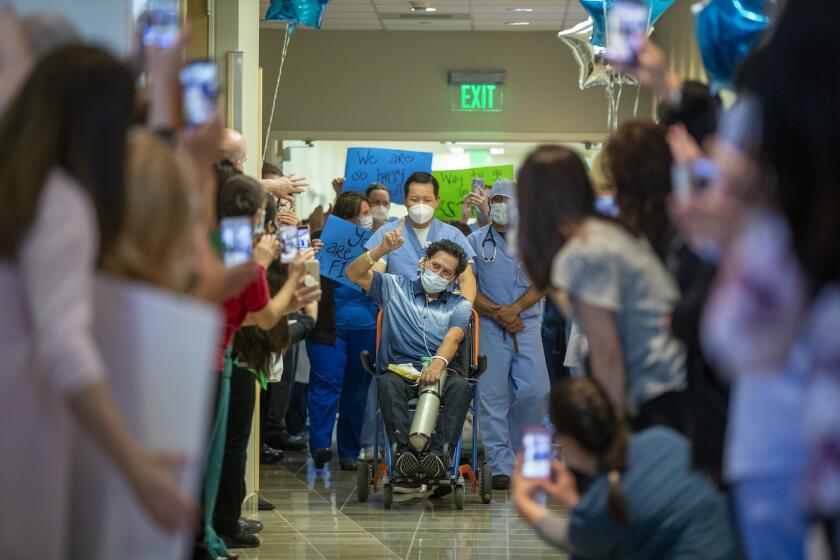Californians battling unemployment amid coronavirus are stymied by state agency’s tech issues

SACRAMENTO — For Californians desperate to get unemployment assistance during the COVID-19 pandemic, the last month has been a perfect storm of failures for a state government with a long history of technology problems.
Many seeking jobless benefits in recent weeks found phone lines jammed at the state Employment Development Department and had their calls disconnected before they could talk to a live service representative at the agency, which processes unemployment insurance claims.
Others said their attempts to file applications at the state’s unemployment insurance online portal were greeted with error messages, frozen screens and other glitches, showing that the state’s technology systems were woefully unprepared for a disaster of this magnitude.
These are some of the unusual new scenes across the Southland during the coronavirus outbreak.
With millions of Californians thrown out of work by the state’s stay-at-home order, services offered by the EDD have buckled under a lack of sufficient technology to support them, an issue that has plagued the agency for years but has now been put into stark relief by the current crisis.
“I know this sounds crazy because we are in California, we are the tech center of the world, but our system is built on multiple antiquated systems, and because of that it is inflexible — it is very difficult to change,” California Labor Secretary Julie Su said in a Facebook Live chat Friday.
State officials have scrambled to roll out improvements to the claims process, including extending call center hours and even suspending a requirement that applicants certify their eligibility for benefits, but despite the measures, many jobless people say they still have not received the financial assistance they need.
The effort to resolve problems with the claims system is all the more urgent because the state on Tuesday will begin accepting millions of unemployment assistance claims from those previously excluded from the process, including independent contractors, gig workers and the self-employed.
Assembly Republican Leader Marie Waldron of Escondido credits Gov. Gavin Newsom with trying to resolve the problems amid an unprecedented flood of new unemployment claims, but she said technology problems are a “recurring theme” in California state government.
“This is unacceptable,” Waldron said of the EDD’s issues with processing claims. “Our constituents need help, and the state’s ongoing lack of modernization creates a barrier for accessing services by our most vulnerable.”
The governor’s March 19 order requiring Californians to stay at home to slow the spread of the coronavirus has resulted in many businesses temporarily closing, putting millions out of work. Within days of the order, Californians complained that they could not get through by phone to the EDD, whose call center was open for just a few hours each day from 8 a.m. to noon, five days a week.
Newsom initially ordered a shift of 1,300 state workers to create a second EDD call center with expanded hours from 8 a.m. to 8 p.m. seven days a week. Although the new call center can answer general questions and help reset passwords, it does not have the capability of processing claims or resolving problems with those that have been filed, officials said.
As a result, unemployed Californians have continued to complain of problems reaching the agency to process their claims. Calls by The Times to the new line each day last week confirmed the issues were not resolved.
“We are currently receiving more calls than we have the capacity to answer,” a recorded message at the new call center said Friday. “At the end of the message the phone will hang up.”
The message urges people to instead use UI Online, an internet portal that allows people to file applications for unemployment insurance benefits digitally.
But that, too, appeared to be a dead end for many who tried to log on to the website and reported receiving an error message. On Wednesday and Thursday, a disclaimer was posted for visitors to the website: “Some customers are experiencing issues using this service. We’re working to restore it as soon as possible. Please check back later.”
The disclaimer was removed Friday and replaced with a note warning that UI Online would be “unavailable” from 6 p.m. Friday to noon Saturday for “service maintenance.”
The computer problems forced the EDD to suspend a requirement that applicants certify eligibility when they apply and every two weeks afterward. Su, the labor secretary, said that has helped reduce traffic that was causing system problems.
On Thursday, Newsom again acknowledged the ongoing problems with the EDD call center, saying the state was “working overtime” to address the issues and noting that the agency has processed an unprecedented 3.2 million new claims for unemployment benefits received in the last month.
A claim is deemed processed when a benefit is paid or denied, but EDD officials declined to provide data on how many claims have been initiated and denied.
“None of us are naive about the responsibility we have as a state and as an administration to make sure that the call center gets cleaned up and we do more in continuing to process those claims,” Newsom said during his daily public briefing on the coronavirus crisis.
Though many people say they have been unable to file claims or have had claims rejected, the state has made payments to about 76% of those who were able to submit an application, said Maurice Emsellem, the Fair Chance program director at the National Employment Law Project.
Los Angeles resident Jeff Williams said he filed an unemployment claim April 1 after losing his e-commerce job, but despite trying to reach the EDD by phone and email, he has not been able to find out when benefits will start arriving.
“This is terrible that you can’t get an answer even after the increase in hours” at the call center, Williams said. “I am now out of money and have limited food. Something needs to be done.”
In response to the continued complaints, Newsom said Friday that the state would again redouble its efforts to improve the unemployment insurance process, announcing that a few hundred more state employees were being transferred in to help handle the flood of calls to “address some of the anxiety around getting access to an individual human being to answer the phone.”
The EDD also acknowledged in a notice to the public Thursday that it is aware of “the persistent inability of claimants to access the UI Online.”
California’s state employment agency is no stranger to problems in processing claims. It has a history of computer glitches and other technical issues dating back nearly 20 years.
In 2003, the EDD proposed two projects to modernize access to its unemployment insurance services at a total cost of $96 million, according to a 2010 report by the independent Legislative Analyst’s Office. The work, which included upgrades to the EDD’s call centers and call routing system, and automating the claims process for customers, ran into delays that pushed its original 2008 completion schedule back at least four years as costs swelled.
“Total costs went from an original $96 million to $159 million,” the analysts reported.
Before that work could be completed, the EDD’s archaic computer system caused delays of a month or more for unemployment checks to an estimated 117,000 Californians in 2009, The Times reported.
In 2013, as many as 300,000 unemployment checks were delayed when the then-upgraded computer system malfunctioned over Labor Day weekend.
That May, the agency made the decision to shut down its call centers from noon to 5 p.m. because of deep cuts in federal funding.
Now, the limited hours have fueled the chaos over claims during the pandemic, which has been compounded by the EDD’s issues at its other points of service.
Barbara Gessler, 66, who worked part time at the St. Francis Mission gift shop in San Francisco, said she was able early in the process to access the EDD’s online claims portal, but she was unable to complete her application because the system repeatedly gave her an error message. Then, when she called the unemployment office for help, she could not reach a live service representative.
As a result, Gessler ended up mailing in a paper application April 17 and has not heard yet whether it has been approved.
“There is no way working people can support themselves when government services fail like this,” Gessler said of her experience with the EDD, which she called “incredibly frustrating, time-consuming and disheartening.”
Others who created online accounts were repeatedly stymied last week while trying to check on the status of their benefits.
“An error has occurred,” read a message to users of the benefits portal. “Please try again later.”
In addition, those who hoped to apply to an EDD program called Work Sharing, which seeks to help companies keep employees on their payroll by providing unemployment benefits for reductions in hours, were shocked to discover they could not do so online — paper applications must be filled out and sent in, adding to delays in approval.
Martin Haley, who was furloughed by a company that provides classes on energy healing techniques, wanted to use Work Sharing but has been unable to get approved after discovering that applications can’t be filed online.
“This program relies exclusively on mail-in applications, mailed-back responses and physical claim forms that employers are supposed to physically hand to their employees,” Haley said. “This cannot stand as the only option in a time like this.”
Despite the obstacles, the state so far this year has approved Work Sharing applications for 768 employers and 9,766 employees, said Loree Levy, an EDD spokeswoman.
“The Work Share program has traditionally required processing of paper applications and certifications for ongoing benefit payments due to different ways the EDD has to coordinate with employers and their employees compared to the regular UI program,” Levy said.
The state had started working on updating the process before the pandemic and hopes to offer some automation features to help people apply in the first week of May, she added.
Haley offered another description of Work Sharing: “It’s a program in place since 1978 that’s still using 1978 methods.”
More to Read
Sign up for Essential California
The most important California stories and recommendations in your inbox every morning.
You may occasionally receive promotional content from the Los Angeles Times.














